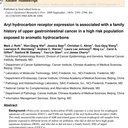Crude extracts from Lycium barbarum suppress SREBP-1c expression and prevent diet-induced fatty liver through AMPK activation.
Palavras-chave
Resumo
Lycium barbarum polysaccharide (LBP) is well known in traditional Chinese herbal medicine that, has beneficial effects. Previous study reported that LBP reduced blood glucose and serum lipids. However, the underlying LBP-regulating mechanisms remain largely unknown. The main purpose of this study was to investigate whether LBP prevented fatty liver through activation of adenosine monophosphate-activated protein kinase (AMPK) and suppression of sterol regulatory element-binding protein-1c (SREBP-1c). Male C57BL/6J mice were fed a low-fat diet, high-fat diet, or 100 mg/kg LBP-treatment diet for 24 weeks. HepG2 cells were treated with LBP in the presence of palmitic acid. In our study, LBP can improve body compositions and lipid metabolic profiles in high-fat diet-fed mice. Oil Red O staining in vivo and in vitro showed that LBP significantly reduced hepatic intracellular triacylglycerol accumulation. H&E staining also showed that LBP can attenuate liver steatosis. Hepatic genes expression profiles demonstrated that LBP can activate the phosphorylation of AMPK, suppress nuclear expression of SREBP-1c, and decrease protein and mRNA expression of lipogenic genes in vivo or in vitro. Moreover, LBP significantly elevated uncoupling protein-1 (UCP1) and peroxisome proliferator-activated receptor-γ coactivator-1α (PGC-1α) expression of brown adipose tissue. In summary, LBP possesses a potential novel treatment in preventing diet-induced fatty liver.





